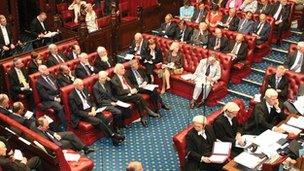Lords reform: Tory MPs meet to oppose the plans
- Published

There are currently more than 800 members of the House of Lords
Conservative MPs are meeting later to discuss how best to oppose the government's plans to reform the House of Lords.
Members of the home and constitutional affairs sub-committee of the 1922 committee will gather to gauge the growing opposition to the plans on all sides of the Commons.
The Cabinet is hoping to agree next week its final proposals for a largely elected second chamber. The bill will then be discussed by MPs before the summer break.
But the BBC has learned that the government has been forced to assemble a rarely-used committee to hammer out coalition differences over the detail.
The "coalition committee" has been used only a couple of times since the coalition was formed and is designed to resolve disputes between the parties. It was used during the row over the government's controversial health reforms.
The policy is being driven by Deputy Prime Minister Nick Clegg who believes the government should seize a rare opportunity to introduce radical constitutional reform. Conservative ministers however are more cautious and wonder if voters will thank them for, in their words, wasting time on arcane parliamentary procedures instead of focusing on the economy.
The key question is how far the government will go to try to reassure MPs who oppose the plans for Lords reform.
I understand that ministers have agreed to rewrite the bill to make it clear that the House of Commons will still be able to pass laws without the approval of the reformed Lords.
Many MPs fear that elected members of the reformed Lords would be more assertive and threaten the primacy of the Commons.
The bill will now explicitly state that the so-called parliament acts would continue to limit the power of a reformed House of Lords. This would mean that the Lords would continue to be able to delay legislation for a year, but could not block it indefinitely.
"We are going to say that the Parliament Acts still apply, even in a reformed house," said one source.
Some opponents say this change will make no difference as the parliament acts are rarely used and more legitimately elected Lords would feel less reluctant to delay legislation.
The first crucial test will come when the bill comes up for its so-called "second reading" in the Commons in July. MPs will discuss the measure in principle for, almost certainly, two days.
But at the end of the second reading debate, MPs will be asked by the government to agree how many days they should debate the detail during the so-called committee stage of the bill.
The government will put down a procedure motion setting out a certain number of days. Many MPs are expected to oppose this so they can attack the bill day after day on the floor of the Commons.
The opponents will only be able to defeat the government on this procedure motion if Labour backs them. And there are signs Labour is rowing back from its plans to give the bill a rough ride. Party sources had indicated last month that they would oppose the bill's timetable but they now insist that no decision has been made.
A Labour spokesman said: "This is very premature speculation. No decisions have been made, no bill has been published, and it has not yet been discussed at shadow cabinet."
Some Labour MPs say the party must oppose the timetable and ensure that the bill is given the long scrutiny it deserves. They also like the idea of making the government squirm night after night over controversial legislation.
But other Labour MPs say that they must oppose the government on policy alone. Labour favours a 100 per cent elected house, not 80 per cent as the government is proposing.
The party also wants a referendum on the reforms. Some Labour MPs fear that opposing the timetable would make the party look opportunistic and go against what they say are Ed Miliband's reforming instincts. They also want to avoid an all-out war with Liberal Democrats with whom they might want to form a coalition after the next election.
One senior Labour source said: "Ed's instincts are not to play silly buggers on this. He does support reform. But tactical considerations will grow stronger as the number of Tory rebels increase."
For now, ministers and officials are struggling to agree the details of the bill. Such is the pressure that I understand that parliamentary draughtsmen were forced to work through the Jubilee bank holiday to get the bill ready on time - and it is still not finished.
One detail ministers have agreed is to accept a recommendation from a parliamentary committee for a larger reformed Lords made up of 450 members, not the 300 the government originally planned.
- Published9 May 2012
- Published14 June 2012
- Published10 May 2012